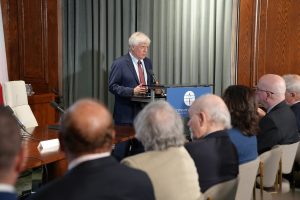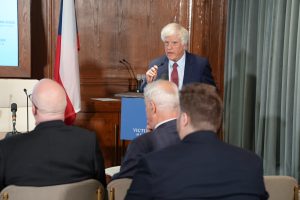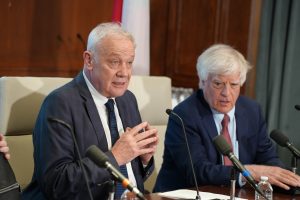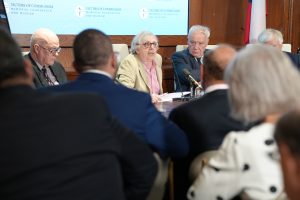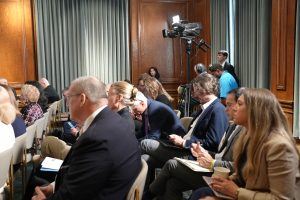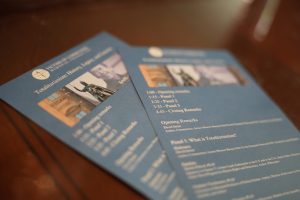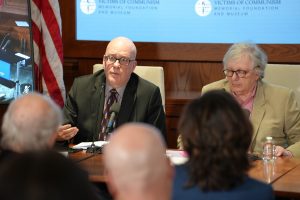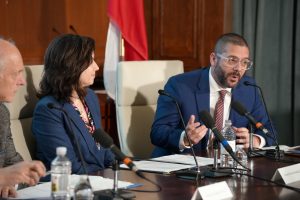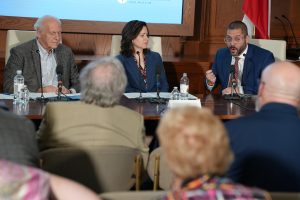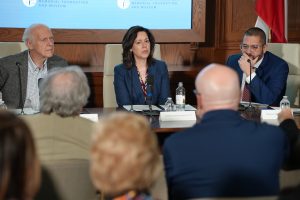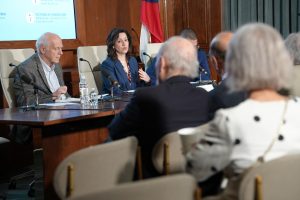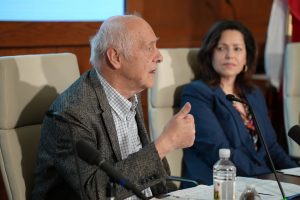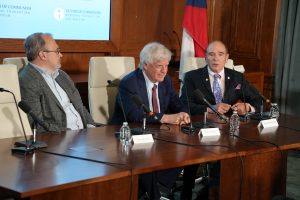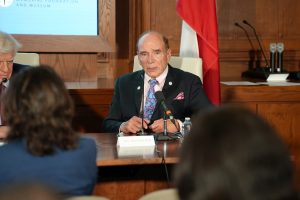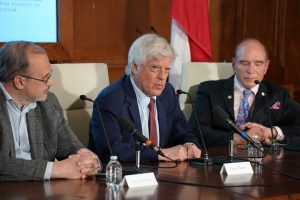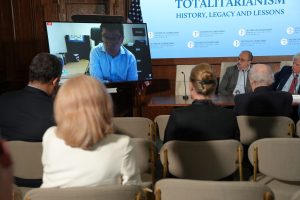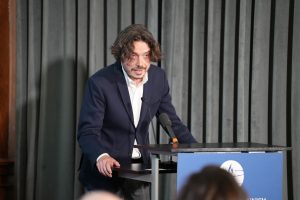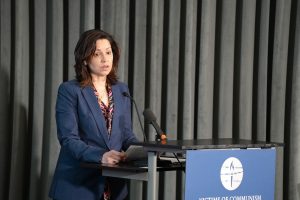The Victims of Communism Memorial Foundation hosted a seminar on totalitarianism, on May 24th at the Victims of Communism Museum. The conversation included presentations by leading journalists, diplomats, and scholars in cooperation with the Czech Institute for the Study of Totalitarian Regimes and the Steven J. Green School of International and Public Affairs at Florida International University. The event marks the 70th anniversary of the first academic conference on the challenge of totalitarianism in Boston in March 1953 when the Soviet Union posed a grave threat to the Free World. Three panels explored, respectively, the meaning of totalitarianism; teaching the nature and history of totalitarianism; and, finally, the legacy of totalitarianism in our world today – a case study of the Russian invasion of Ukraine.
Panel One: What is Totalitarianism moderated by David Satter, author, commentator, former Moscow Bureau Chief for the Financial Times and VOC Academic Council Member, featuring panelists Martin Palouš, Signatory to Charter 77, former Czech Ambassador to the U.S and to the U.N., Senior Fellow, Director of FIU’s Václav Havel Program for Human Rights and Democracy, and Author/Philosopher, Vladimir Tismăneanu, PhD, University of Maryland Professor of Political Science, Analyst, Director of the Center for Post-Communist Societies, and Author, and Orlando Gutierrez-Boronat, PhD, Spokesperson for the Cuban Democratic Directorate, Member of the Assembly of the Cuban Resistance and Author/Philosopher.
Panel Two: Teaching Totalitarianism moderated by Shlomi Dinar, PhD, Interim Dean of the Steven J. Green School of International and Public Affairs at Florida International University, Professor in the Department of Politics and International Relations, featuring panelists Elizabeth Edwards Spalding, PhD, Chairman of the VOC Board, Founding Director of the VOC Museum, Author, and Senior Fellow, Pepperdine School of Public Policy, Jacques Rupnik, PhD, Research Professor Emeritus at CERI-Sciences Po, Author, Paris, France, and Ladislav Kudrna, PhD, Director, Institute for the Study of Totalitarian Regimes (USTR), Prague, The Czech Republic.
Panel Three: The Legacy of Totalitarianism moderated by the Hon. Don Ritter, ScD, Former Member of Congress, Former National Academy of Sciences Fellow in USSR, ranking member Congressional Helsinki Commission and VOC Board Trustee, featuring panelists Taras Kuzio, PhD, British Academic, Professor of Political Science, National University of Kyiv, Mohyla, Author, Commentator, United Kingdom, Denis Bilunov, Russian Opposition Politician in Exile, Sociologist, Co-founder of the Prague Anti-War Committee, Fellow at Charles University, Prague, the Czech Republic, David Satter, Author, Rhodes Scholar, former Moscow Bureau Chief for the Financial Times, Commentator and VOC Academic Council Member.
Connecting the Seminar and the Vaclav Havel Exhibit: Pavel Hajek, Curator, Václav Havel Library, Prague, The Czech Republic
Closing Remarks: Elizabeth Edwards Spalding, Ph.D., Chairman of the VOC Board, Founding Director of the VOC Museum, Author, and Senior Fellow, Pepperdine School of Public Policy
The seminar followed the opening of a Václav Havel-centered exhibit in the Grand Hall of the VOC Museum that morning. The exhibit features the life and work of Václav Havel and his role in understanding the deeper meaning of totalitarianism, its impact on the human condition, and its relevance to contemporary society. The exhibit also features the Prague-based statuary of the Disappearing Man, perhaps the most significant work of art in the world in depicting the human destruction (spirit, soul, consciousness) resulting from totalitarian rule.
About the Speakers:
Denis Bilunov
Denis Bilunov is a founding member of Prague Russian Anti-War committee, a PhD candidate at Charles University (Faculty of Social Sciences), a journalist and a former public person in Russian democratic opposition. Mr. Bilunov graduated from Moscow University. He was a long time collaborator with Garry Kasparov (1996-2010). In 2005 he launched Kasparov.Ru website (coverage of opposition news in Russia). He was co-founder and the first executive director (2008-2010) of All-Russian Solidarnost movement and organizer of many opposition events and street rallies in Russia, including major protests in 2011-12. For years Bilunov acts also as a journalist, currently at The Insider webzine. In 2015 he left Russia and later rejoined his academic studies, first at Rome Business School (2018-2019, Master in Political marketing) and then at Charles University (2020 – present). Mr. Bilunov is one of the organizers in the Russian anti-Putin diaspora, aiming to get international recognition for a newly-established Russian political body in exile.
Shlomi Dinar
Shlomi Dinar is Interim Dean in the Steven J. Green School of International and Public Affairs and a Professor in the Department of Politics and International Relations. Dinar’s research interests lie at the intersection of international environmental politics, security, and negotiation. In particular, he has published in the area of conflict and cooperation over transboundary rivers (a field popularly known as ‘hydro-politics’). In addition, he works on the linkages between climate change and international water issues, particularly as such a relationship pertains to the resilience and effectiveness of international river basins and institutions, respectively. Dinar’s research includes other areas and topics such as the nexus between political demography and technology and terrorism. Among his publications, he has authored or co-authored International Water Treaties: Negotiation and Cooperation along Transboundary Rivers (Routledge 2008), International Water Scarcity and Variability: Managing Resource Use Across Political Boundaries (University of California Press 2017), and edited Beyond Resource Wars: Scarcity, Environmental Degradation, and International Cooperation (MIT Press 2011). Dinar is also working on several forthcoming book manuscripts, which include a set of 4 volumes titled World Scientific Handbook of Transboundary Water Management (World Scientific Press) where he is Editor-in-chief. His writings have also appeared in such journals as International Studies Quarterly, Journal of Peace Research, Political Geography, Terrorism and Political Violence, and Foreign Affairs, among others. Among his other professional accomplishments, Dinar has been part of several collaborative consultancy projects for the World Bank that included team members from the United States, Spain, and Israel.
In addition to his service to the profession as journal and book manuscript reviewer, Dinar is currently on the editorial board of International Environmental Agreements: Politics, Law, and Economics. In 2018, Dinar sat on the Thomas R. Pickering Foreign Affairs Fellowship Selection Committee. Dinar has also been invited to give talks and seminars in academic institutions, which have included the School of Public Policy at the University of California, Riverside; University of Sussex; Venice International University; and the Norman Paterson School of International Affairs at Carleton University, among others. Invited talks in public/organizational forums include NATO (as part of the organization’s Advanced Research Workshop) and the Department of Foreign Affairs and International Trade (Government of Canada), among others. Dinar was also an Anna Sobol Levy Fellow at the Hebrew University of Jerusalem, Israel, and Pemberton Fellow in the Institute of Advanced Study at Durham University, United Kingdom.
Before being appointed Interim Dean, Dinar was Associate Dean for Graduate Studies and Innovation. In that capacity he managed and oversaw all graduate studies (MA and Ph.D.) related affairs, oversaw School-wide market-rate and executive education opportunities, managed efforts to expand internship and career opportunities, assisted with the evaluation of the School’s Programs, Centers and Institutes, and reviewed all research grant applications submitted by the School’s faculty, among other responsibilities. He is the Faculty Director for the Master of Arts in Global Affairs program. As Faculty Director, he is responsible for all academic-related matters including curriculum, course offerings, and Capstone research projects. Dinar completed his doctoral studies at Johns Hopkins University’s School of Advanced International Studies and master’s studies at Columbia University’s School of International and Public Affairs. He completed his undergraduate studies at the University of California, Davis. AREA OF EXPERTISE International Environmental Politics, International Environmental Institutions, Environment and Security, Hydro-politics, Climate Change, Terrorism, Conflict Resolution, and International Negotiation. DEGREES B.A., University of California, Davis M.A., Columbia University, School of International and Public Affairs Ph.D., Johns Hopkins University, Paul H. Nitze School of Advanced International Studies
Orlando Gutierrez-Boronat
Orlando Gutierrez-Boronat was born in Havana, Cuba in 1965. He holds a PhD in the Philosophy of International Studies from the University of Miami and graduate and undergraduate degrees from Florida International University. He has been an invited Lecturer on Political Theory at the Global Leadership Program of Georgetown University, and has worked as a professor of history and political science at institutions of higher learning for the past 20 years. Six of his books have been published and his articles have appeared in prominent publications in the United States and abroad. His latest book “Cuba: the Doctrine of the Lie,” has been among the top sellers in the Amazon section of books on Cuba. As co-founder and spokesman of the Cuban Democratic Directorate (Directorio), one of the most prestigious organizations in the struggle for democracy in Cuba, Dr. Gutierrez Boronat has spoken at different conventions and conferences around the world on Cuba’s struggle for human rights and democracy. He was elected coordinator of the Assembly of the Cuban Resistance, a unifying coalition of pro-democracy organizations inside and outside Cuba. Dr. Gutierrez Boronat has a strong media presence, frequently being interviewed by different media venues on Cuba, Latin America and the struggle for freedom and human rights around the world.
Ladislav Kudrna
Ladislav Kudrna is Director of the Institute for the Study of Totalitarian Regimes. He has also worked as a historian for the Institute for the Study of Totalitarian Regimes as well as Head of the Department for Research on the Period of Non-Freedom. He was also a historian at the Ministry of the Interior of the Czech Republic, Department of Archives of Security Forces and the Office for Documentation and Investigation of Crimes of Communism. Kudrna was involved in Doctoral studies at Charles University in Prague, Faculty of Arts, Department of Czech History. He was the Director of the Secretarial office at the National Museum and worked in the State District Archives, Benešov.
Taras Kuzio
Professional Experience: Professor in the Department of Political Science, National University of Kyiv Mohyla Academy. Previous positions were at the International Institute of Strategic Studies; NATO Information and Documentation Centre, Kyiv, Ukraine; Institute for European, Russian, and Eurasian Studies, George Washington University; German Marshall Fund of the US, Washington DC; Foreign Policy Institute, School of Advanced International Studies, Johns Hopkins University; Centre for European, Russian, and Eurasian Studies, University of Toronto; and Canadian Institute of Ukrainian Studies, University of Alberta.
Education: Post-Doctoral Fellow at Yale University; PhD in political science from the University of Birmingham, England; MA in Area Studies (USSR, Eastern Europe) from the School of Slavonic and East European Studies, University of London; and BA in Economics from the School of European Studies, University of Sussex. Member of Editorial boards: Demokratizatsiya: The Journal of Post-Soviet Democratization, Communist and Post-Communist Studies, and Eurasian Geography and Economics.
Published Books: author and editor of 23 books, including Fascism and Genocide. Russia’s War Against Ukrainians (2023); Russian Nationalism and the Russian-Ukrainian War. Autocracy-Orthodoxy-Nationality (January 2022); Ukraine’s Outpost: Dnipropetrovsk and the Russian-Ukrainian War (January 2021); Crisis in Russian Studies. Nationalism (Imperialism), Racism and War (2020); (co-author) The Sources of Russia’s Great Power Politics: Ukraine and the Challenge to the European Order (2018); Putin’s War Against Ukraine. Revolution, Nationalism, and Crime (2017, 2019); Ukraine. Democratization, Corruption, and the New Russian Imperialism (2015); From Kuchmagate to Orange Revolution (2009); and Theoretical and Comparative Perspectives on Nationalism (2007).
Ambassador Martin Palouš
Doc. RNDr Martin Palouš, PhD (studied Natural Science, Philosophy and International Law) is Senior Fellow and Director of the Václav Havel Program for Human Rights and Democracy at the Steven J. Green School of International and Public Affairs of Florida International University. He is also President of International Platform for Human Rights in Cuba. He belonged to the original signatories of Charter 77, served as its spokesperson in 1986 and participated at the creation of Civic Forum during the Velvet Revolution (November 1989). After the fall of Communism he was a member of Parliament (1990), Deputy Minister for Foreign Affairs (1990-1992, 1998-2001), Ambassador of the Czech Republic to the United States (2001-2005) and Permanent Representative of the Czech Republic to the United Nations (2006-2011). He has lectured at many universities both in the Czech Republic and in the world (particularly in the United States) and is author of numerous publications in the areas of political philosophy, contemporary history, international relations, and international law.
The Hon. Don Ritter, SC.D
After 10 years on the faculty and administration of Lehigh University and as a consultant to industry, Don Ritter served in the United States House of Representatives from 1979 to 1993. Ritter was the Founder and former President and CEO of the Afghanistan Foundation, the President and CEO (now Emeritus) of the Afghan American Chamber of Commerce, and the Senior Advisor to the Afghan International Chamber of Commerce in Kabul. He had been engaged in business in Afghanistan from 9/11 to the U.S. pullout. Given his over 40 years’ experience with Afghanistan, Ritter understands that infiltration by Soviet Russia-backed Afghan communists into key roles in Afghan society, over decades, was the root cause of the modern Afghan wars and the present desperate plight of the Afghan people. In Congress, Ritter was directly involved in combatting the global spread of Soviet communism by authoring legislation providing material aid to Afghan rebels. Ritter believes that the USSR would not have collapsed without losing badly in their Afghan war. While in Congress, Ritter also served on the Congressional Helsinki Commission and as the Founding Chairman of the Ad Hoc Committee on the Baltic States and Ukraine. Ritter served as Chairman and President of the National Environmental Policy Institute (NEPI) for a decade after leaving Congress. He is fluent in Russian and spent a year as a NAS-Soviet Academy post-doctoral Research Fellow at the Baikov Institute for Metallurgy in Moscow. Ritter holds a B.S. from Lehigh University and a M.S. and Sc.D. from MIT.
Jacques Rupnik
Jacques Rupnik was educated at the University of Paris-Sorbonne and at Harvard, is currently Research Professor at CERI-Sciences Po in Paris as well as visiting professor at the College of Europe in Bruges. Since he joined CERI, Sciences Po in 1982 he has been writing and lecturing about East-Central and Balkan European history and politics and their process of European integration. He was advisor to president Vaclav Havel in the 1990’s. Executive director of the International Commission for the Balkans, Carnegie Endowment for International Peace (1995-1996) and drafter of its report Unfinished Peace (1996); member of the Independent International Commission on Kosovo (1999-2000) and co-drafter of The Kosovo Report (Oxford UP, 2000). Among the various positions held: advisor to the European Commission (2007 – 2010). Member of the board of the Institute for Historical Justice and Reconciliation in The Hague 2010-2017. Member of the board of directors of the European Partnership for Democracy in Brussels (2008-2013). He has been a visiting Professor at several European universities and at Harvard.
J.Rupnik’s publications include The Other Europe (1989), De Sarajevo à Sarajevo, l’échec yougoslave (1992), Le Printemps tchécoslovaque 1968 (1999), 1989 as a Political World Event: Democracy, Europe and the new international system, with an introduction by V.Havel, London, Routledge, (2014), Géopolitique de la démocratization, l’Europe et ses voisinages, Presses de Sciences Po (2014), Europe at the Crossraods: Democracy, neighbourhoods, migrations, Prague, Vaclav Havel Library, 2018; Senza il muro, l’Europa et il mondo dopo il crollo del communismo, Rome, Donzelli, 2019.
David Satter
David Satter is a senior fellow at the Hudson Institute, a fellow of the Foreign Policy Institute of Johns Hopkins University School of Advanced International Studies, and a long-time observer of Russia and the former Soviet Union. Mr. Satter graduated from the University of Chicago and Oxford University, where he was a Rhodes Scholar and earned a B.Litt. degree in political philosophy. He worked for four years as a police reporter for the Chicago Tribune and, in 1976, he was named Moscow correspondent of the London Financial Times. He worked in Moscow for six years, during which time he sought out Soviet citizens with the intention of preserving their accounts of the Soviet totalitarian system for posterity. Mr. Satter has written three books about Russia: It Was a Long Time Ago and It Never Happened Anyway: Russia and the Communist Past; Age of Delirium: The Decline and Fall of the Soviet Union; and Darkness at Dawn: the Rise of the Russian Criminal State.
Elizabeth Edwards Spalding, Ph.D.
Dr. Elizabeth Edwards Spalding is Chairman of the Victims of Communism Memorial Foundation (VOC) and Founding Director of the Victims of Communism Museum. She has served as a VOC Trustee since 2018. As Founding Director, Dr. Spalding was instrumental in the establishment of the Victims of Communism Museum, overseeing the extensive research, writing, and execution of the entire project. A third-generation anticommunist, she has devoted her career to scholarship and education about the history and horrors of communism.
Dr. Spalding teaches subjects ranging from U.S. foreign policy, national security, and international relations to the presidency, religion, and politics as Senior Fellow at the Pepperdine University School of Public Policy and Visiting Fellow at the Van Andel Graduate School of Government at Hillsdale College, and previously taught at Claremont McKenna College, George Mason University, and the Catholic University of America. A frequent public lecturer on numerous topics, especially communism and the Cold War, she is also a core faculty member in VOC’s National Seminar for Middle and High School Educators. She is the author of The First Cold Warrior: Harry Truman, Containment, and the Remaking of Liberal Internationalism and the co-author of A Brief History of the Cold War. Her scholarly and popular articles and reviews have been published widely, including in Journal of Church and State, Orbis, The Wilson Quarterly, Providence, The American Mind, Law & Liberty, H-Diplo, and Claremont Review of Books.
Dr. Spalding holds a Ph.D. and an M.A. in international politics and political theory from the University of Virginia and a B.A. in politics from Hillsdale College. She lives with her family in Arlington, Virginia.
Vladimir Tismaneanu
Vladimir Tismaneanu (Romanian pronunciation: born July 4, 1951) is a Romanian American political scientist, political analyst, sociologist, and professor at the University of Maryland, College Park. A specialist in political systems and comparative politics, he is director of the University of Maryland’s Center for the Study of Post-Communist Societies, having served as chairman of the editorial committee (2004–2008) and editor (1998–2004) of the East European Politics and Societies academic review. Over the years, Tismăneanu has been a contributor to several periodicals, including Studia Politica, Journal of Democracy, Sfera Politicii, Revista 22, Evenimentul Zilei, Idei în Dialog and Cotidianul. He has also worked with the international radio stations Radio Free Europe and Deutsche Welle, and authored programs for the Romanian Television Company. As of 2009, he is Academic Council Chairman of the Institute for People’s Studies, a think tank of the Romanian Democratic Liberal Party. Between February 2010 and May 2012, he was also President of the Scientific Council of the Institute for the Investigation of Communist Crimes in Romania.

